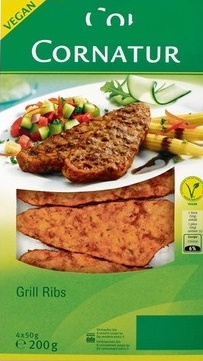Grill Ribs - Cornatur - 200 g
This product page is not complete. You can help to complete it by editing it and adding more data from the photos we have, or by taking more photos using the app for Android or iPhone/iPad. Thank you!
×
Barcode: 7613269267805 (EAN / EAN-13)
Common name: Ribs vegan à griller
Quantity: 200 g
Packaging: Cardboard, fr:Barquette plastique
Categories: Plant-based foods and beverages, Plant-based foods, Meals, Meat alternatives, Meat analogues, fr:Végétarien
Labels, certifications, awards:
Vegetarian, Vegan, European Vegetarian Union, European Vegetarian Union Vegan, FSC, FSC Mix


Manufacturing or processing places: Suisse
Stores: Migros
Countries where sold: France, Switzerland
Matching with your preferences
Environment
Packaging
Transportation
Threatened species
Report a problem
Data sources
Product added on by dimoqwertz
Last edit of product page on by worldtest.
Product page also edited by anticultist, foodrepo, kiliweb, openfood-ch-import, openfoodfacts-contributors, packbot, roboto-app, yuka.R2I0RklLZzhvL1VRbi9ZKzJ6RFgyOE5vM0xPUWYwSHBDK2tLSWc9PQ, yukafix.









